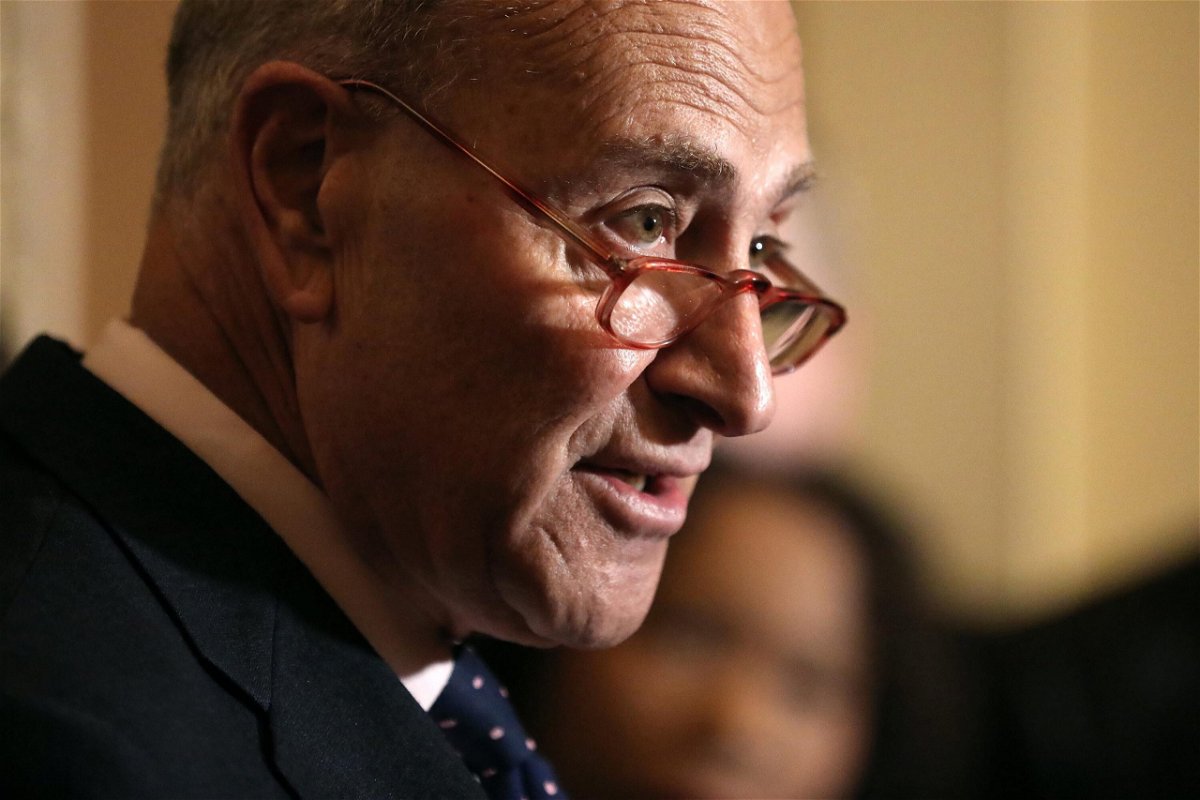Schumer strong-arms negotiators on infrastructure and budget deal inspiring Republican revolt

Senate Majority Leader Chuck Schumer set a key deadline next week to force his caucus to agree on a $3.5 trillion budget package and to pressure a bipartisan group of negotiators to finalize an infrastructure deal.
By Ali Zaslav, Manu Raju, Ted Barrett and Lauren Fox, CNN
Senate Majority Leader Chuck Schumer set a key deadline next week to force his caucus to agree on a $3.5 trillion budget package and to pressure a bipartisan group of negotiators to finalize an infrastructure deal, a high-stakes gambit that has huge implications for President Joe Biden’s agenda but was already frustrating Republicans.
Schumer announced Thursday that he plans to set up the first procedural vote on the bipartisan infrastructure bill for next Wednesday. At the same time, Schumer also set next Wednesday as a deadline for the entire Senate Democratic caucus to agree to move forward on their separate, partisan multi-trillion budget resolution aimed at many key aspects of Biden’s legislative priorities.
“Today I’m announcing that I intend to file cloture on the vehicle for a bipartisan infrastructure bill on Monday of next week,” Schumer said in floor remarks, explaining that on Monday he would take procedural steps to set up the Wednesday vote, where 60 votes would be needed to open debate on the bipartisan bill.
“Senators will have until Wednesday of next week before the initial vote on cloture on the motion to process,” the Democrat from New York continued. “Everyone has been having productive conversations and it’s important to keep the two-track process moving. All parties involved in the bipartisan infrastructure bill talks must now finalize their agreement so that the Senate can begin to consider that legislation next week.”
This is an effort by Schumer to strong-arm negotiators to reach a bipartisan deal that had once appeared close at hand, but several important sticking points remain unresolved, particularly on the pay-fors for the $1 trillion package, which Biden has backed. But it remains unclear whether senators will be able to meet this self-imposed deadline.
However, Republicans rebelled against Schumer’s announcement, an early indication that the bipartisan talks could be in danger of falling apart altogether. With negotiations over the bill still underway, a handful of Republicans say they don’t even know if the legislation will be ready in time for a vote and that it is premature to set a deadline given the state of the talks.
Asked directly if he would vote yes on a procedural vote if the bill text wasn’t ready, Sen. Mitt Romney, a Republican from Utah and a member of the bipartisan talks, said it would be a “dereliction of duty” to advance a bill that had not been written.
“We are certainly not going to vote on a bill that hasn’t been drafted yet,” Romney said.
Sen. Rob Portman, an Ohio Republican and another member of the group, said he wouldn’t vote “yes” unless the bill was completed.
“I’m not gonna vote yes if we don’t have a product,” Portman told CNN. “We’re gonna get it right.”
If the Wednesday vote succeeds, the Senate would be on the bill, which would allow Schumer to then file a substitute amendment, which would be the agreed-to bipartisan bill.
Schumer continues to reiterate that the two-track strategy has a long, bumpy road ahead as Democrats try to move two infrastructure packages through the Senate, one bipartisan and another that includes much of Biden’s agenda items. Schumer has called for “total agreement” on both before moving on either bill.
The vote next week is just a procedural vote to begin the debate, but Republicans are viewing Schumer’s tactic as undermining the process and warn it could lead the negotiations to crumble.
“It’s laughable,” Sen. John Cornyn, a member of Republican leadership, told CNN. “I don’t know if he is setting the bipartisan bill up to fail so he can then move to the reconciliation bill or what.”
Shortly after Schumer’s announcement, Senate Minority Leader Mitch McConnell went on Fox News and blasted the Democrats’ spending plans as “wildly inappropriate for the country, totally out of bounds for what ought to be done. And that’s why it will generate zero Republican support, and hopefully there will be a few brave Democrats who will realize that running the country into the ground over taxing and debt is not a good idea.”
McConnell also warned inflation spikes the country is suffering now will be made worse by all the new spending.
Sen. Roger Wicker, a Republican who initially was engaged in bipartisan talks with the White House, said he wouldn’t be in favor of moving ahead on the bipartisan proposal next week.
“I don’t see how we can,” Wicker said.
Other Republicans who have been on the fence when it comes to the bipartisan bill said that they are dubious of any package Schumer is trying to ram through so quickly.
“If you declare you are going to file cloture on a $1.2 trillion bill that no one has read including the people who supposedly wrote it and say, ‘it’s coming, everyone get ready to support it,’ that is not a rational conversation,” Sen. James Lankford, a Republican from Oklahoma said.
Schumer brushed aside Republican concerns about his newly-announced plans Wednesday, saying they’re going to press forward.
“I’ve talked to some of our Democratic members of the bipartisan group, they’re making very good progress,” he said at a press conference. “There is no reason why we can’t start voting next Wednesday, and that’s what we’re going to do.”
Democrats argue that it’s necessary to set a forced deadline in order to put some pressure on the bipartisan group of senators who have been working on the proposal for months. Before the July recess, the group announced a deal in principle, but they are still stuck on a series of outstanding items, including whether or not to come up with additional ways to finance the bill. There are also divisions within the group about whether to keep a provision that would empower the IRS to collect unpaid taxes.
“We are still working on all the fine details,” said Sen. Mike Rounds, a Republican from South Dakota who is part of the bipartisan group.
Asked if he feels like Schumer is trying to squeeze Republicans with his deadline, Rounds said, “of course.”
“It’s part of the game,” Rounds said.
This story and headline have been updated with additional developments Thursday.
The-CNN-Wire
™ & © 2021 Cable News Network, Inc., a WarnerMedia Company. All rights reserved.




